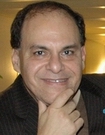
Mohammed ISMAIL
Biography - Mohammed Ismail is a Professor and Founding Director of the Analog VLSI Lab at the Ohio State University, USA and of the RaMSiS Group at KTH, Sweden. He is also with the ElectroScience Lab at Ohio State. Currently, he conducts research on robust low power RF and mm-wave ICs for wireless, bio and multimedia applications with a focus on manufacturable low cost high volume CMOS solutions for mobile and wearable embedded devices. He served as a Corporate Consultant to over 30 companies and is a Co-Founder of Firstpass Technologies, Inc. a developer of RF and mixed signal IPs. He Co-founded ANACAD-Egypt (now part of Mentor Graphics). He advised the work of over 50 Ph.D. students and of over 95 M.S. students. He authored or co-authored a dozen books and over 250 journal publications and has 11 US patents. He received the US Presidential Young Investigator Award, the Ohio State Lumley Research Award four times, in 1992, 1997, 2002 and 2007 and the US Semiconductor Research Corporation’s Inventor Recognition Award twice. He is a Fellow of IEEE.
Mohammed ISMAIL
Ohio State University, USA currently on leave at Khalifa University of Science, Technology and Research (KUSTAR), UAE
E-mails: ismail@ece.osu.edu or m.ismail@ieee.org
Abstract – To achieve the highest performance/price ratios of handheld wireless devices, the current trends in wireless chip set development call for a programmable cognitive-like multi-standard nanometer CMOS radios integrated on a single chip. This represents a grand challenge to both the yield and validation of such chip sets and typically requires several silicon spins which will increase the NRE development costs and may result in significant product delays and in missing important market windows. To meet this challenge we present design techniques for “self-awareness” and “self-healing” of multi-band, multi-mode CMOS radio systems and demonstrate the validity of these techniques in the design of WiMAX/LTE CMOS radio front ends. Moreover, we will review the Evolution of the wireless technology and chipsets beyond 3G as well as the basic principles of zero-IF CMOS multi band, multi mode radios from antenna to bits. We will also present a compact transceiver architecture suitable for TDD radio systems.
The talk is intended for RFIC, baseband and SoC design engineers, researchers and graduate students as well as product and marketing managers. The material will be given at an introductory level. So newcomers to the field are welcome.